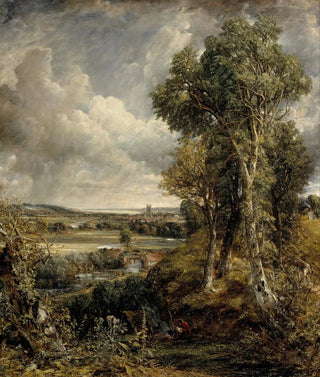Art print | The Dedham Valley - John Constable


View from behind

Frame (optional)
In the world of art, certain works stand out for their ability to capture the very essence of a landscape, evoke deep emotions, and transport the viewer to another time. "The Dedham Vale" by John Constable is one of these creations that, through its beauty and poetry, invites endless contemplation. Created in 1820, this canvas masterfully illustrates the English landscape, where nature is both majestic and soothing. Through this work, Constable offers us an intimate look at rural life, a tribute to the beauty of the English countryside, which, at his time, was already threatened by industrialization. The soft light bathing the valley and the meticulous details of the trees and clouds testify to a profound love for nature and a desire to preserve it in the collective imagination.
Style and uniqueness of the work
John Constable's style is characterized by a naturalistic approach, where light and atmosphere play a central role. In "The Dedham Vale," he manages to create harmony between the sky, the land, and the water, using fluid brushstrokes to render the texture of the clouds and the richness of the foliage. The color palette, soft and nuanced, evokes a serenity that soothes the soul. Every element of the composition, from the sparkling stream to the lush hills, is carefully thought out to guide the viewer's gaze across the painting. This artwork is not just a representation of a landscape; it tells a story, that of a moment suspended in time, where nature and man coexist in perfect harmony. The piece is also a pioneering example of the Romantic movement, where emotion and subjectivity take precedence over simple realistic depiction.
The artist and his influence
John Constable, born in 1776 in Suffolk, is one of the most influential painters of the English landscape. His passion for nature and his desire to capture its nuances led him to develop a unique technique that has marked the history of art. Constable always sought to depict reality with emotional intensity, thus opposing the academic conventions of

Matte finish

View from behind

Frame (optional)
In the world of art, certain works stand out for their ability to capture the very essence of a landscape, evoke deep emotions, and transport the viewer to another time. "The Dedham Vale" by John Constable is one of these creations that, through its beauty and poetry, invites endless contemplation. Created in 1820, this canvas masterfully illustrates the English landscape, where nature is both majestic and soothing. Through this work, Constable offers us an intimate look at rural life, a tribute to the beauty of the English countryside, which, at his time, was already threatened by industrialization. The soft light bathing the valley and the meticulous details of the trees and clouds testify to a profound love for nature and a desire to preserve it in the collective imagination.
Style and uniqueness of the work
John Constable's style is characterized by a naturalistic approach, where light and atmosphere play a central role. In "The Dedham Vale," he manages to create harmony between the sky, the land, and the water, using fluid brushstrokes to render the texture of the clouds and the richness of the foliage. The color palette, soft and nuanced, evokes a serenity that soothes the soul. Every element of the composition, from the sparkling stream to the lush hills, is carefully thought out to guide the viewer's gaze across the painting. This artwork is not just a representation of a landscape; it tells a story, that of a moment suspended in time, where nature and man coexist in perfect harmony. The piece is also a pioneering example of the Romantic movement, where emotion and subjectivity take precedence over simple realistic depiction.
The artist and his influence
John Constable, born in 1776 in Suffolk, is one of the most influential painters of the English landscape. His passion for nature and his desire to capture its nuances led him to develop a unique technique that has marked the history of art. Constable always sought to depict reality with emotional intensity, thus opposing the academic conventions of






